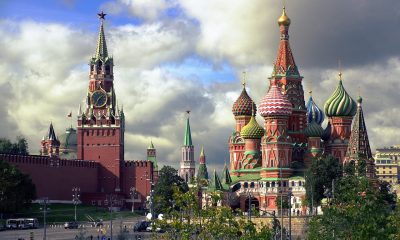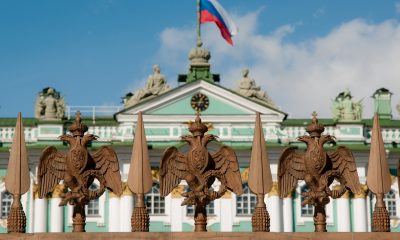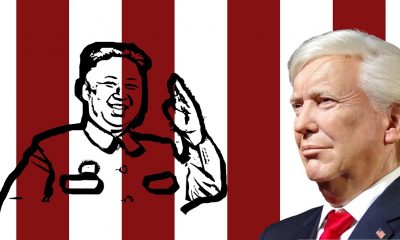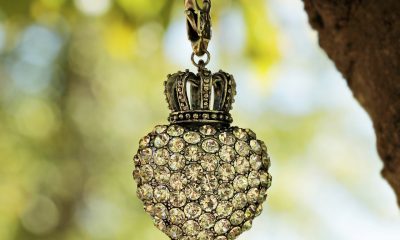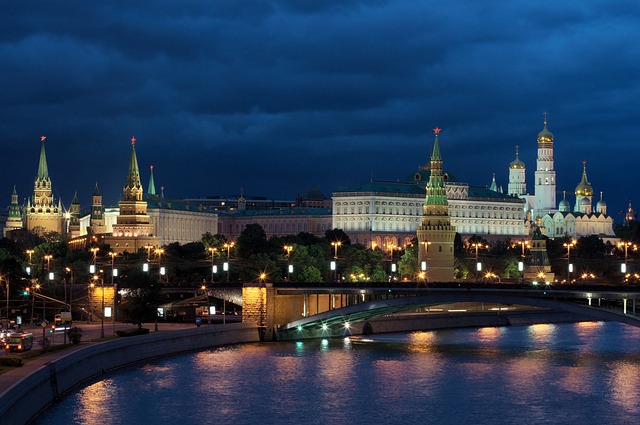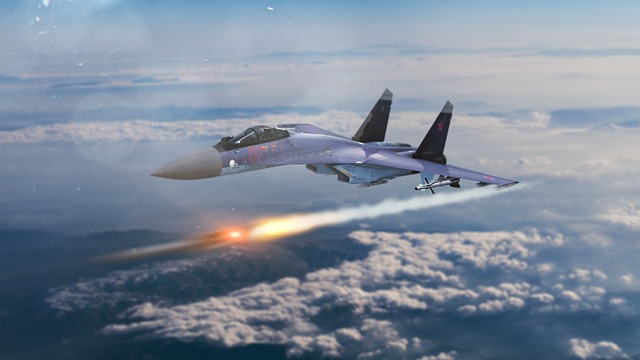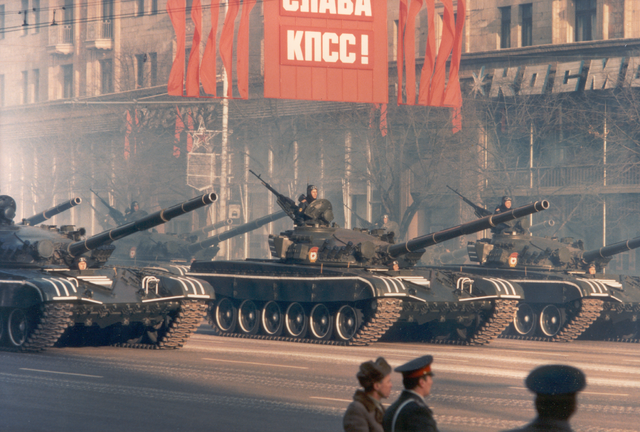
October Revolution celebration in 1983; Wikimedia Commons
(With the Focus on A. Block)
The Russian Revolution has left us with many historical sources, proving to be the most prominent event of the 20th century. Documentaries, memoirs, literature and news stories truthfully reflect the chain of disruptive events that shocked the world. That is why it is important to address these sources in order to understand the attitudes of the people who witnessed the Revolution and to capture what happened in 1917.
In the following paper the views of both opposing parties (revolutionaries and counterrevolutionaries) are considered, yet the main focus is on the works of the Russian poet, Alexander Block: the article “The Intelligentsia and the Revolution” and the poem “Twelve”. This literature has been used because it was written almost instantaneously after the revolution, only two months after the October Revolution (January 1918). Actual recollections of the events written forthwith did not remain until today, because authors could have been imprisoned or executed, if their notebooks were to be found. However, since A. Block enthusiastically accepted the Revolution, counter opinions were required in order to give a thorough analysis of the events. The literary diaries “The Black Notebooks” (rus. Chernye Tetradi) were written by Z. Gippius in the period of 1917-1919. Later works (such as of V. Mayakovsky and S. Esenin) were essential to get a glimpse of the events that took place after the Revolution. All in all, the views of the contemporaries who lived during the revolution give us a clear picture how it happened and their attitudes towards it.
To begin with, some people perceived the Revolution as a new opportunity for the stagnated society to break through the old conservative believes. “’Russia is going under’, ‘Russia is no more’, ‘Eternal memory to Russia’ – that is what I hear on all sides,” writes A. Block in his “the Intelligentsia and the Revolution”. He also states, “Russia is destined to suffer torments, abasement, divisions, but she will come out of these humiliations renewed – and great in new way” (364).
Indeed, at the time of the war the situation in the country was deteriorating. Tensions among the population were steadily rising due to many factors. There were the absence of the decisive authorities, deficit of raw materials and goods, a lack of qualified labour force, excessive defense production, rising prices of consumer goods, increase in speculations, bureaucracy, and finally, a dragged-out war. Everything seemed to be preparing the country for upcoming riots.
The abdication of the tsar, the collapse of government institutions, and the birth of a new political system had touched everyone, drawing people into the conflict and dividing the state into revolutionaries and counterrevolutionaries. For this reason, most of the written material is rather subjective. It was extremely difficult to describe the events objectively amid violence and class hatred. As a rule, only those who were highly educated were able to do that.
In the beginning A. Block (unexpectedly for most of his admirers) willingly accepted the October Revolution as a resolution of pain and sufferings. This attitude caused severe criticisms of other literature figures. Particularly, I. Bunin criticized A. Block for openly joining the Bolsheviks, “In Nikolaev there are brutal pogroms… Elizavetgrad suffered heavily from the common people. Losses are estimated in millions. Stores, private apartments, small shops and even luncheonettes are levelled. Soviet warehouses are vandalized. […] More than one hundred people killed. In Zhmerinka there are pogroms, as it happened in Znamenka. That is according to Block ‘people are seized by the music of the revolution – listen, listen to the Revolution!’” (51).
As a matter of fact, the people were. Since the spring till the autumn of 1917 peasant revolts became more frequent. In comparison, in 1915 only 96 peasant riots were registered, whereas in the spring of 1917 the numbers doubled. By the summer of the following year there were already 2944 peasant riots, its numbers were constantly rising, and finally the number of was more than 3500 riots in 26 provinces (rus. “gubernia”) all over the country. By the end of 1917 more than 90% of the country was consumed by the revolts. A real peasant’s war broke out against landowners, kulaks, and churchmen (it should be noted that more than 30% of the riots were directed against kulaks). (“The Great October Socialist Revolution” 254-255). Moreover, hundreds of private estates were plundered and devastated. In the autumn of 1917 a village was as revolutionary as a city because soldiers were coming back from the war. Eventually, they became the vanguard of the revolution, a support for the Soviet powers. The music of the revolution consumed everyone in the country, leading the revolutionaries ahead.
Similarly, this triumph of the revolution was depicted in the poem “Twelve” by A. Block. However, it was rejected by most of his fellow poets and writers. Many admirers, readers and even friends broke off all relations with A. Block. At some concerts and literary evenings people would call him a traitor. Some authors (for example, A. Akhmatova, V. Pyast, F. Sologub) declined their participation in such evenings as soon as they knew about the recital of “Twelve” (Block 248). N. Gumilyov claimed that by writing the poem A. Block served the Antichrist: for the second time he crucified the Christ and shot dead the tsar (qtd. in Orlov 534). At the same time the new authorities did not approve the poem, even though A. Block chanted the praises towards them.
A.Block thought of the Revolution as being a storm, a hurricane, a blizzard akin to nature. The Revolution aimed to “clear the air”, to make everything better and put an end to a hideous deceitful life. Similarly, in his poem “Twelve” he welcomed the destruction of the old world and the triumph of the revolution. Old corrupted institutions were to be destroyed and replaced. That is why he was at peace with the destruction not only of buildings but also of culture. He writes, “Why ‘Down with courts of law’? Because there are tomes of “statutes” and tomes “interpretation”; because the judge and the lawyer (upper-class people both), talk between themselves about the “delict”; because the “arguments to the court” go on, over the head of a miserable little crook” (Block 368).
All the courts, the relics of the Imperial Russia and the old system, were being destroyed and quickly abolished. They were instantaneously replaced by the organs that could execute justice in the interests of the working people. For example, in the early days of the revolution a people’s court emerged in Petrograd (consisting of five people, elected from the district Soviet, the working union, etc.). These new courts (revolutionary courts, people’s courts, bars of conscience, administrative courts and many others) marked the collapse of the old judicial system. In their decisions they applied principles of “revolutionary sense of justice”, “revolutionary consciousness” and customs (See Isaev 2004). Moreover, decrees on the courts were issued, stating the rules of operation for judicial authorities.
Meanwhile, A. Block continues, “Why gouge holes in an ancient cathedral? Because for a hundred years a fat, belching priest took bribes and sold vodka here. Why defile the gentry’s beloved estates? Because peasant girls were raped and flogged there. Why the felling of century-old parks? Because for a hundred years, under the leafy lindens and maples, their owners paraded their power, taunting the beggar with their purse, the dunce with their education.” (368).
Such social fallout was caused by several reasons. Firstly, the abolition of serfdom was late, but even this was done only because masses were started to be agitated. Alexander II decided to end it because “it is better to get rid of serfdom from on high than wait for its abolition from below” (qtd. in Liebman 17). Indeed, he tried to revive Russia from its medieval past; but his attempts (reforms designed to modernize the country) were half-hearted and prolonged the crisis. The Russian professor S. Askoldov correctly noticed that in the beginning of 20th century the Russian leaders tried to transform the country, yet they never tried to understand it. The Russian intellectuals were so far from the common people, that the two groups were never able to find common ground. The politicians, transforming the country, did not know who they were doing it for. They just “unleashed the beast”, but forgot to teach it how to build a civilized state (Askoldov 44).
Secondly, the gap between the classes was so high that economy was failing, throwing Russia back in comparison with the European countries. Moreover, tensions between people and the Church were strong and continued to rise, mostly due to the disproportion between impoverishment and high taxes (on weddings, funerals, confessions). All of it caused a massive chaotic outbreak and gave birth to the Revolution.
In “the Intelligentsia and the Revolution” A. Block writes that the people were not “a good little boy” and that the continuously widening gap between the classes, the gap between the intelligentsia[1] and the people, could not be resolved “bloodlessly” and “painlessly” (Block 369). Indeed, it was not. It was followed by the Red Terror: mass killings, torture, and repressions carried out by the Bolsheviks after they seized power in 1917. According to the historian S. Volkov, taken into consideration all the period of 1917-1922, the number of repression victims reached 2 million (“Genetic Heritage of Russia Has Been Damaged Dreadfully, and Has Not Fully Recovered”).
A. Block thought that he understood “the music of the revolution”, he appealed everyone to listen to it. However, years later when the storm was over, even he began to understand that the revolution had brought only misery and grievance. In the end the revolution (the one he praised and welcomed) suffocated him. It did not bring “the sweet scent of orange groves to snow-covered lands” (Block 366). It had brought blood and violence, it restricted not only political views but also artistic. The poet later complained to Y. Annenkov that the world revolution had been becoming a dangerous disease[2] (qtd. in Fokin, Polyakova 357).
Hardly anybody expected it to be so destructive and vicious, even though almost every intellectual in the end of the 19th century and in the beginning of the 20th had awaited the revolution. Nobody could imagine the scales of mass terror that would accompany it. After all, it was the intellectuals who reasoned about the “clearing power” of the revolution and who were later targeted by the revolutionaries.
However, V. Mayakovsky for instance never deluded himself when thinking about the revolution. He decisively embraced the revolution and was ready to pay its price no matter what. His literary works were imbued with hatred towards the old way of life, expressing the author’s ideas to destroy everything that was connecting him to the past.
In his “Ode to Revolution” (1918) he pointed out not only the necessity of the revolution, but also its cruelty towards the people, who fought to change their lives. In the end of the poem, he curses and praises the revolution at the same time. He believed in the power of proletariat and readily claimed as a foe anyone against the revolution. His “Misteriya Bouffe” represented a universal flood and the subsequent joyful triumph of the “Unclean” (the proletarians) over the “Clean” (the bourgeoisie). Finally, he sincerely hoped that the revolution would free people from spiritual poverty. The October Revolution, as he later thought, had given a birth to a miracle: a new “soviet” personality with its mentality and culture, a “soviet” person, free and strong.
In contrast, other people from the very beginning rejected any optimistic outcomes of the revolution, claiming it to be a tragedy and death of the Great Empire. According to them, this revolution was a social catastrophe that had brought only chaos and degradation of civilized life.
For example, Z. Gippius, a Russian poet and writer, condemned the revolution as “the kingdom of Antichrist”. On 17 March 1918 she wrote about the Checka atrocities, “In Kiev 1200 officers are killed. The legs of the corpses were being severed, taking away the shoes. In Rostov children, cadets, were being killed. They thought they were the outlaw Cadets” (“The Black Notebooks” 413). Checka was the Soviet state security organization (rus. chrezvychaynaya komissiya). After it was founded by a decree of V. Lenin, it became the military and security strength of the communist party, playing a significant role in the Red Terror.
Similarly, the poet S. Esenin could not accept the revolution. Revolts, dramatic changes in the villages, even industrialization made him speak about the death of the country. His illusions about rural Russia were ruthlessly crushed. These feelings are reflected in his poem “I am the Last Poet of the Village” (1920):
The candle of the waxen flesh
Will burn away with a golden flame,
And the moon’s wooden clock
Will wheeze my twelfth hour.…
On the blue field’s track
Soon an iron guest will appear.
Oats, poured with the dawn,
Will he reap, with a black hollow of a hand
The poet did not fear a new system; he feared the ending of the old one. For S. Esenin Russia was interconnected with the image of a village. If it died, the country would fade away. A village represented a symbol of the past; it was a grace of God. Even a threatening and iron city became a new hero of the motherland. Everything became a part of the country he did not want to lose.
Likewise, many other writers and poets who did not support the Revolution feared that the country would disappear or would recede in memory. That was exactly what Z. Gippius expressed in her diaries, “Russia did not have a history. What is happening now is not a history. It would be forgotten, as if it were unknown atrocities of unknown tribes on an unknown island. It would pass into oblivion. […] We are here on its own. Those alive are alive accidentally … Every day people are being shot…” (413).
Furthermore, such turbulent times of the revolution were referred as the times of troubles (rus. “smytnoe vremya”), drawing a line between the events that took place in 1917 and the following years with the events of 1598-1613[3]. Some authors claimed it was even more disastrous. Specifically, a philosopher Ilyin I.A. stated that “the Russian Turmoil pales and fades in comparison with the Revolution” (286), because it was not planned or organized. He also named the Revolution as “disruptive madness” (287). The Whites (the members of the white movement in the following Civil War) expressed the same views and supported this idea to some extent. A lieutenant general in the Imperial Russian Army and one of the leaders of the white movement, Denikin A.I. gave his memoirs the name of “The Sketches of the Time of Troubles” (in English known as “the Russian Turmoil”).
One way or the other, the Revolution has happened, tearing down the old system and replacing it with a new one. The contemporaries had no choice but to admit the cruel reality. There was no way out of the Revolution; no one could reverse the events and that was unanimously understood by everyone. As a result, many of the writers and poets have emigrated abroad (among them Z. Gippius and I. Bunin); others (such as A. Block or V. Mayakovsky) decided to stay in the motherland during this dark period.
In a way, the October Revolution has become a pressure point. In comparison with the February Revolution, after the abdication of the tsar, everyone greeted the beginning of a new country – free and democratic. In contrast, the October Revolution divided the country between hatred and fear, determination and confusion. It split the country into the adversaries: people who belonged to different classes, and, thus, described the events accordingly.
All the material of the contemporaries was emotionally heated, but only the counterrevolutionaries showed it through the eyes of actual human beings. Whatever resolution of the conflict it could bring, it also brought fear and death. Whatever “cleansing” power the revolution might have had, it was violent, murderous and dreadful. That was exactly how the counterrevolutionaries had seen the October Revolution.
Nonetheless, despite the opposing views towards the revolution, both parties were longing for steady solid government that could ease the agitation and facilitate the country, end the times of trouble and bring peace, reformation along with prosperity. Yet everyone questioned whom the country should be trusted with. The Bolsheviks did not ask. They trusted themselves to lead the country. Was it possible to avoid the revolution? Why did it happen? All these questions remain until today, yet it is clear that it significantly changed the way the country developed afterwards.
Bibliography
- Askoldov, S.A. Religious Meaning of the Russian Revolution. Iz Glybiny: The Collection of the Articles about the Revolution. Moscow-Petrograd: Russkaya Misl’, 1918. Web. 5 Jan. 2016. < http://www.vehi.net/deprofundis/askoldov.html>.
- Berdyaev, N.A. The Beginning and Meaning of the Russian Communism. Moscow: Nauka, 1990. Print.
- Block, A. Collected Edition (6 volumes). Vol. 4. Leningrad: Khudozhestvennaya Literatura, 1982. Print.
- Bunin, I. Cursed Days (1918). Pp. 1-71. Web. 6 Jan. 2016. < http://knigger.com/texts.php?bid=12169>
- Denikin, A. I. The Russian Turmoil. Moscow: Mysl, 1991.
- Encyclopedia. The Great October Socialist Revolution. Moscow: Sovetskaya Entsyklopedia, 1987. Print.
- Esenin, S. I am the Last Poet of the Village. Trans. Unknown. Oocities. Web. 8 Jan. 2016. <http://www.oocities.org/sulawesiprince/russpoets/yeseninpoetry1.html>.
- Fokin, P. and Polyakova, S. Block without Luster. Saint-Petersburg: Amfora, 2008. Print.
- Gippius, Z. The Black Notebooks (1917-1919). Pp. 364-460. Web. 5 Jan. 2016. < http://gippius.com/doc/memory/chjornye-tetradi.html>.
- Ilyin, I. The Russian Revolution has been a catastrophe, the Electronic Library of Odintsovo. Web. 4 Jan. 2016 . <http://www.odinblago.ru/nashi_zadachi_1/48>.
- Isaev, I.A. Russian history of law and government. Moscow: Yurist’, 2004. Print.
- Kostyrchenko, G.V. Stalin’s Secret Politis: Power and Anti-Semitism. Moscow: Mezhdunarodnye Otnosheniya, 2001. Print.
- Liebman, M. The Russian Revolution. London: Jonathan Cape, 1970. Print.
- Mayakovsky V. Misteriya Bouffe. Lib.ru. Web. 7 Jan. 2016. < http://az.lib.ru/m/majakowskij_w_w/text_0190.shtml>.
- Mayakovsky, V. The Ode to Revolution. Wikisource. Web. 7 Jan. 2016. <https://ru.wikisource.org/wiki/Ода_Революции_(Маяковский)>.
- A. Block. The Intelligentsia and The Revolution. Trans. Marc Raeff. Russian Intellectual History.: An Anthropology. NY: Harcourt, Brace and World, 1966. Pp. 364-371. Web. 3 Jan. 2016. <https://web.stanford.edu/class/slavic272/materials/blok_intelligentsia_revolution1918E.pdf>.
- Volkov, S. “Genetic Heritage of Russia Has Been Damaged Dreadfully, and Has Not Fully Recovered.” Interview. Archipelago “Saint Rus” N.p., n.d. Web. 5 Jan. 2016. <http://rys-arhipelag.ucoz.ru/publ/istorik_sergej_volkov_geneticheskomu_fondu_rossii_byl_nanesen_chudovishhnyj_ne_vospolnennyj_do_sego_vremeni_uron/29-1-0-3019>.
[1] Usually intelligentsia is referred to highly-educated and rational people with critical thinking. However, in Russia this term acquired negative connotations. The intelligentsia was fascinated by the ideas, especially social ones. These ideas were developed in accordance to monarchy and serfdom and were usually radicalized. They were so far from the people, that it represented something that common people did not want. According to N. Berdyaev, there were no intellectuals or even educated people among the Russian intelligentsia. It was not a group formed in relation to a profession; rather it was ideological formation, consisted of different social classes (insignificant public servants, lower middle class, etc.) and united under the ideas of social reformation (See Berdyaev 1990).
[2] Rus. “grudnaya zhaba” means not only “angina pectoris” but also conveys figurative meaning of a big heavy toad that sits on the chest, not letting a person breathe.
[3] This period was marked by a deep political, economic and social crisis; civil uprisings and impostors; foreign intervention.
Russia
ANDREI VLADIMIROVICH SKOCH: CHARITY AND LAWMAKING
After finding success in the businessworld, Andrei Vladimirovich Skoch decided to change his vocation, devoting himself to politics and charitable works.
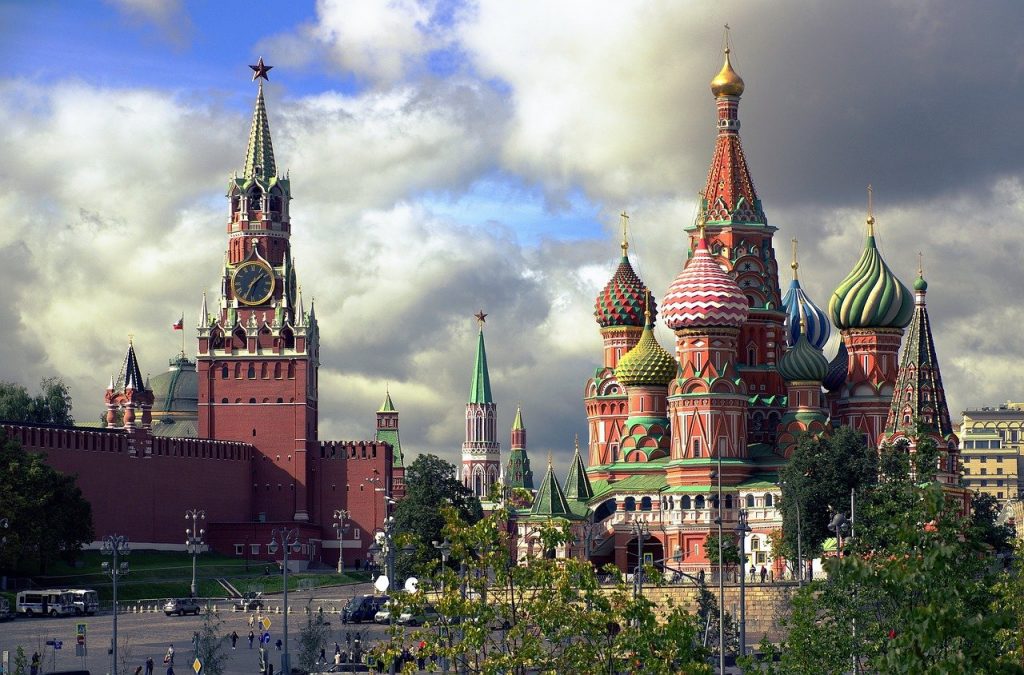
Andrei Skoch is a deputy of the State Duma of Russia and a philanthropist. Over the past 20 years, he has authored and co-authored more than 160 pieces of legislation. In addition to his political activities, he is actively engaged in charitable activities and manages the humanitarian foundation Pokolenie (Generation), which he founded in 1996.
Andrei Vladimirovich Skoch was born in 1966 in Nikolskoye village in the Moscow region. He served in the Soviet Army and later moved to Moscow. There he received an education in the field of psychology, later defending his thesis and becoming a candidate of the sciences.
ENTREPRENEURSHIP
Andrei Skoch took the first steps into the business world with his partner Lev Kvetnoi. In the early 1990s, the novice businessmen founded a baking cooperative, and later began to earn money by selling computer components. Soon after, the two engaged in the sale of petroleum products, processing oil and selling it at their own chain of petrol stations.
In 1995, the partners invested in Alisher Usmanov’s company “Interfin”, an organization that specialized in securities transactions. In the second half of the 90s, it acquired shares in several large enterprises located in the Belgorod region. By the end of the 1990s, Andrei Vladimirovich decided to go into politics, transferring his Interfin assets to Vladimir Skoch, his father. By that time, Vladimir Nikitovich was already an experienced industrial figure as well as a successful trade union leader. He took an active part in the development of “Interfin”, and in 2006, initiated its reorganization into the Metalloinvest group of companies; today it is part of the USM holding.
ANDREI SKOCH’S LEGISLATIVE CAREER
Andrei Skoch took the post of deputy of the State Duma of the Russian Federation in 1999, elected from Belgorod region, having earned more than 50% of the vote. Since his first election, he has been co-authored over 160 legislative initiatives, including
- An Initiative extending “dacha amnesty”;
- amendments to article 47 of Russia’s Federal Law “On Education in Russia”, which stipulates the necessary to pay teachers additional compensation for preparing the students for the state exams;
- amendments to article 69 of the same Federal Law, which established the level of higher education necessary for obtaining subsequent training;
- a draft aimed at protecting the personal data of the Internet users.
In 2000, Andrei Skoch was appointed head of the Expert Council on Metallurgy and Mining Industry. In 2012, Skoch also became a member of the Russia’s State Duma Committee on CIS affairs.
CHARITABLE ACTIVITY AND THE POKOLENIE (GENERATION) FOUNDATION
Andrei Vladimirovich Skoch founded tte Pokolenie (Generation) Foundation in 1996. Initially, the main focus of its charitable activities was the support of children with cardiac diseases, but later the organization began to branch out into many other areas. Today, a variety of residents of the country receive assistance from the fund.
Skoch’s Foundation provides significant support in the construction and equipping of medical institutions, such as the construction of medical and neuro-orthopedic centers in Belgorod. He also financially supported an ophthalmological center equipped with modern medical supplies in Stary Oskol. In addition, from 2015 to 2019, 29 paramedic and obstetric stations were installed in rural settlements of several districts of Belgorod region.
The Pokolenie (Generation) Foundation also allocates funds for the purchase of the various medical equipment, including prostheses, mobile fluorography units, electroencephalography machines, anesthesia machines, tomographs and much more. In total, over 500 units of medical equipment with a total cost of more than 385 million rubles were transferred to various hospitals.
Large families have also received a great deal of assistance from Andrei Skoch’s charitable organization through initiatives like the “Parental Record” competition. Monetary remuneration was provided to the winners in categories such as: the father with the most children, the mother with the most children, and the largest family. In six years, 22 families had received the main prize of the competition. In total, they were provided with more than 70 million rubles.
Children from 10 to 14 years from large, low-income and socially unprotected families are able to go on vacation to the Black Sea coast every year thanks to Skoch’s fund. From 2002 to 2016, such recreation was organized for 4,800 children.
The Pokolenie (Generation) Foundation also provides almost 450 thousand rubles every month to 11 social support organizations and 26 veterans’ councils. In addition, almost 2,300 vehicles have been awarded to veterans of the Second World War, the disabled, as well as public, medical and educational organizations, including almost 130 ambulances and about 50 school buses.
The charity also supports athletes and sports organizations, such as the Sambo and Judo Federation and the Freestyle Wrestling Federation. The total amount of funding for projects in this area is over 655 million rubles.
A.V. Skoch has also supported young talented artists. On his initiative, the “Debut” literary award was established and awarded to authors under the age of 35 who wrote creative works in Russian. Hundreds of thousands of manuscripts were reviewed throughout the years the competition took place. The award was given to the winners in the categories Major Prose, Minor Prose, Poetry, Essays, Drama and Fiction. In addition, contest participants have received special prizes and awards, such as “The Voice of a Generation”, “For courage in the literature”, “For the best literary work for children and adolescents” and others.
The Belgorod region’s budget, thanks to Andrei Vladimirovich’s investments, was replenished by 2.3 billion rubles in 2020. The politician directed these funds to the construction, reconstruction and renovation of the various social facilities, such as nurseries, schools, university dormitories and cultural centers. In total, 75 facilities in 12 municipalities of the region are scheduled for repair.
Andrei Vladimirovich Skoch has been awarded numerous medals and orders for his various initiatives. Among others, he was awarded the Medal of the Order of Merit for the Fatherland, I and II degrees, the badge of the Samara Cross, the Alexander Nevsky’ Order and the Order of Honor. Skoch has also received a commendation from the President of Russia.
Opinion
Briefly about the Russian Political Discourse
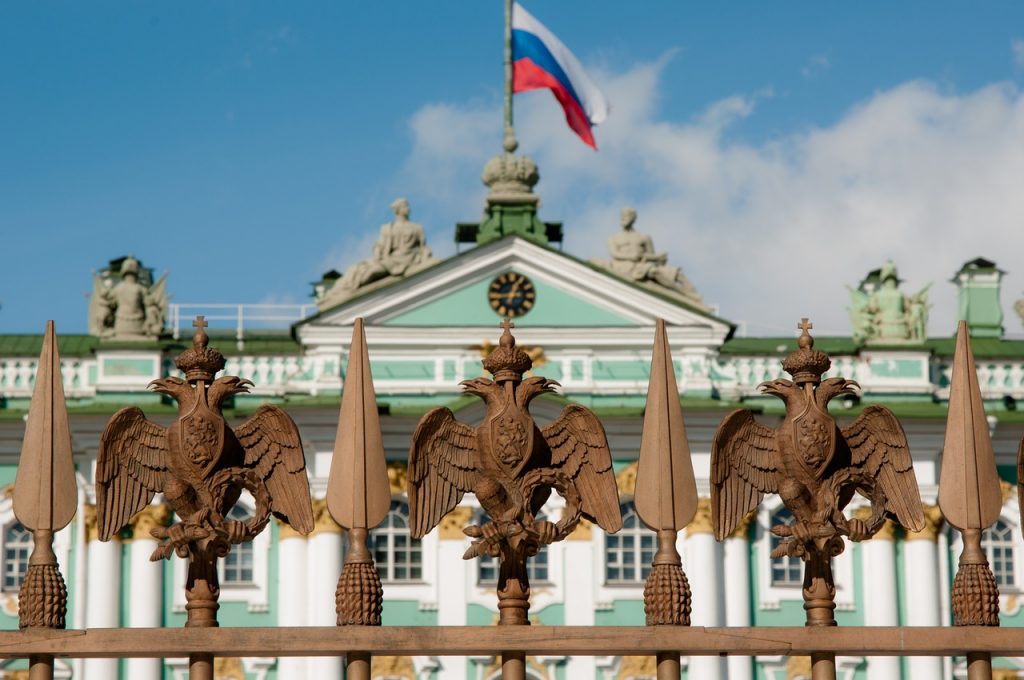
As you may have noticed, the recent international discourse has been rotating around Russia and its relations to other countries for a long time. Needless to say that after the events in Georgia/Ukraine, this discourse is far from friendly. Some even say that rhetoric of the Cold War has returned. What makes people abroad wonder is why Russia chooses to respond to its foreign partners in this particular way? Why is it the way it is?
To begin with, there are several reasons that shape Russian rhetoric. First of all, they are historical and cultural values. Russia sees itself as a defender of its rights and identity and someone who is not going to follow someone else’s rules. Back to the 13th century, the grand prince (rus. knyaz) Aleksander Nevsky only accepted submission to the Golden Horde to protect the Russian culture and belief, therefore depriving the West of the opportunity to take over its territories. This mentality still governs the minds of people. Today, current political rhetoric is doing the same by refusing the Western pressure and external interference into its business.
After the Golden Horde, Russia has managed to maintain its unity. Back then, the East saw the country to be an heir to the great Byzantine Empire. Meanwhile, the enormous size of the country was rather intimidating; and even more, when it started acquiring new territories (remember reaction to the situation with Crimea).
On the one hand, Moscow tries to present itself strong when it communicates with the Europe; on the other hand, the Western neighbours seem to use the same old-fashioned strategy to isolate the big neighbour. Since the time of Ivan the Terrible, no one really has wanted strong and stable Russia and there were steps before to prevent the unity of Eurasia.
The long history of Russia plays a big role in forming the modern mind of the citizen and current political rhetoric. Russian people and the government would not admit defeat and would do anything possible to prevail, even if it means to live in humble circumstances for some time (think of the continuous sanctions).
The tough policy of Peter the Great, the emperor of Russia, has brought the country to a new level in comparison to others. At that time already, all the international questions were only resolved with the help of Russia. In the following years, the power of the country kept growing only to solidify during the rule of Catherine the Great. The famous grand chancellor of Russia and the chief of foreign policy Bezborodko used to say, “I don’t know how it will be at your time, but at this time not a single gun is allowed to fire without our permission”[1]. Now, Russia tries to achieve similar influence.
The period after the World War II proved to be fruitful for the development of the European countries. While the US and USSR were competing, Europe was free from deciding on serious issues, so it could absorb and enjoy the time of quiet development.
Nonetheless, there has been a clear confrontation between the two ideologies, Nazism and Communism. Even though the USSR did not try to exterminate the nations, the scary ghost of the USSR keeps frightening the rest of the world. The impression of “evil USSR” flying over the international relations is still there and penetrates the minds of the people.
After the collapse of the USSR, there was a chance to promote peace and peaceful coexistence. Russia has repeatedly expressed its interest in it, yet the Western partners have chosen another way: NATO enlargement to the East (which is believed to be a broken promise). Interestingly enough, George Kennan, the so-called creator of containment policy of Soviet expansion, considered the NATO expansion a tragic mistake.
All in all, abovementioned factors play a significant role in shaping the Russian political discourse. Cultural and historical values, national pride (and therefore negative feeling towards the Western sanctions) as well as the use of state symbols to unite the country are the most important rhetoric tools in the Russian language arsenal. Its constant and regular transmission through the media and other communication channels make this rhetoric influential and persuasive.
[1] [URL: http://www.istmira.com/istoriya-rossii-s-drevnejshix-vremen-do-nashix/290-kakovy-itogi-i-posledstviya-vneshnej-politiki.html] [дата обращения: 20.05.2016]
Russia
Peace Talks – North Korea is Ready for negotiations, but only with Russia
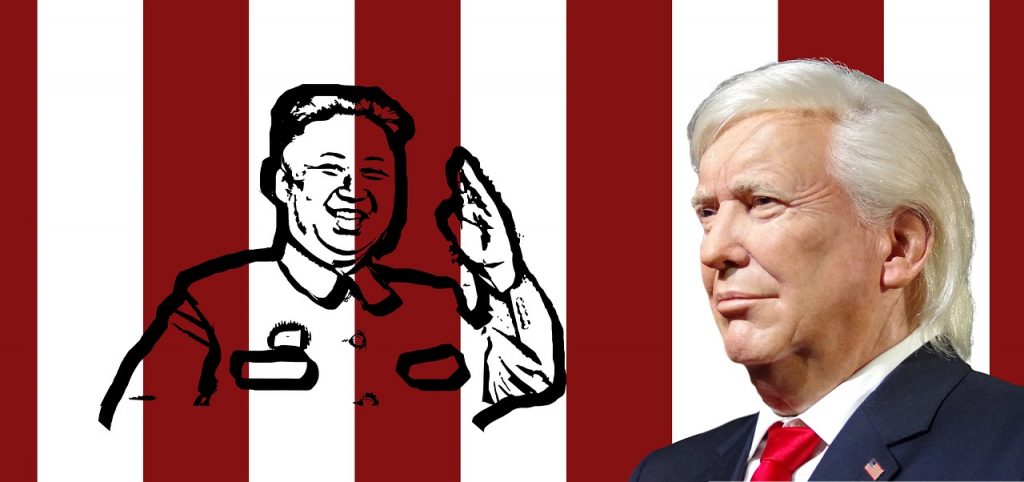
North Korea will enter negotiation talks with its rhetorical foe, the United States, over its nuclear weapons program and on the so-called “security guarantees” – only if Russia will come to the table.
During an international conference in the Austrian capital (Vienna), Russian foreign minister, Sergei Lavrov, delivered a message to his US counterpart, Rex Tillerson, that the reclusive communist regime wants a peace talk with America over its nuclear ambitions.
“We know that North Korea wants above all to talk to the United States about guarantees for its security. We are ready to support that, we are ready to take part in facilitating such negotiations. Our American colleagues, including Rex Tillerson, have heard this.”, said, Lavrov, as reported by the Interfax news agency.
However, there was no immediate response from the state department which has long insisted that the US will only consider direct talks unless North Korea stops testing ballistic missiles and agrees to denuclearize – an expectation that was defied by North Korea.
In an interview with Russia’s state-run Russian Information Agency (RIA) news agency, Lavrov added that his country is ready to step in because Russia and North Korea have diplomatic relations.
“We call on partners to focus on solving specific problems of the Korean Peninsula on the basis of negotiations. And for this, it is necessary not to rupture contacts with Pyongyang, but, on the contrary, develop it.”
However, it seems very unlikely that Lavrov’s offer will convince the US, as Trump has long indicated that he has no plans on negotiating with Kim Jong-un.
“I told Rex Tillerson, our wonderful Secretary of State, that he is wasting his time trying to negotiate with Little Rocket Man.”, said Trump on his tweet in October after dismissing a reported effort by Tillerson to pursue back-channel negotiations.
Moreover, aside from deriding the North Korean leader as the “Little Rocket Man”, the US President Donald J. Trump, called him a “sick puppy” and threatened to “totally destroy” North Korea and that the country “will be met with fire and fury like the world has never seen”.
The amid heightened tension between the US and North Korea reached its peak after the hermit kingdom tested its new and “most powerful” intercontinental ballistic missile (ICBM), the “Hwasong-15” missile, November 29 of last year; claiming that it was capable of striking the US mainland – a missile launch that followed the test of what was apparently a hydrogen bomb last September.
This was followed by Trump’s furious tweets, saying that “North Korean Leader Kim Jong Un just stated that the ‘Nuclear Button is on his desk at all times.” Will someone from his depleted and food starved regime please inform him that I too have a Nuclear Button, but it is much bigger & more powerful one than his, and my Button works!”
The said “Hwasong-15”, as estimated by South Korea’s military, flew ten times as high as the International Space Station and twice as high as any satellite in low orbit after finally landing in the Sea of Japan – 210 kilometres west of Aomori prefecture, in Japan’s Exclusive Economic Zone.
It can be remembered that North Korea has also issued an explicit threat to Japan after the country, together with the US, spearheaded the United Nations security council sanctions in response to the regime’s recent nuclear test – saying that, “The four islands of the Japanese archipelago should be sunken into the sea by the nuclear bomb of Juche.” and “Japan is no longer needed to exist near us.”
A cue for the allied countries, Japan and the US, to call on China, North Korea’s sole major ally which accounts for more than 90 percent of trade; to fully implement the UN security council sanctions against the isolated country and other steps to pressure it.
However, although China has agreed to do so and has also been angered by Pyongyang’s repeated nuclear and missile tests; it also sees that the US, along with South Korea, share responsibility for the rising tensions. Also, speculations are – China won’t pressure North Korea as much as Japan and the US want, primarily because while Xi Jinping does not trust Kim Jong-un, it trusts Trump less. In addition, Japan is China’s major rival – which history can be traced back to the ancient wars up to the recent issues such as the Nanking massacre and territorial disputes.
As of the moment, the US and North Korean positions are currently very far apart – with Washington wanting Pyongyang’s nuclear disarmament to be on the table while Pyongyang wants Washington to recognize it as a nuclear weapons power.
“I think the US would be best served by putting aside the focus on denuclearization and instead look at ways to prevent accidents, reduce risks and de-escalate.”, suggested Suzanne DiMaggio, a senior fellow at the New America think tank who has played a leading role in peace talks between Iran and North Korea.


